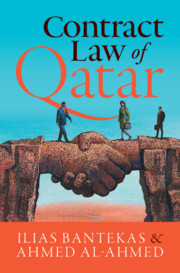The regulation of contracts is nowadays a matter of transnational concern. Countries in the Gulf have made great efforts to diversify their economies by, among others, enhancing and transnationalising their legal systems. Qatari contract regulation has gone through several phases of development and modernisation in its relatively short history, starting from its first civil code in the early 1970s that was inspired by the Egyptian civil code of 1948. Although this book focuses on Qatar’s current civil code, as well as related legislation, the authors are not oblivious to the fact that a big part of the economy is cross-border in nature and by implication, most of the pertinent contracts are governed by foreign laws or (soft law) principles, such as the UNIDROIT Principles of International Commercial Contracts. There is equally an interplay between the influence, or the remnants, of Egyptian private law and the infusion of Anglo-American law as a result of the influx of foreign law firms in Qatar and their dominance in the market. Still, the regulation of contracts by Qatari law is substantial and most contracts entered by state entities are governed, to one degree or another, by this law. What is more, the sustained growth and investment in Gulf legal systems by GCC nations is slowly contributing to a diverse, pluralistic, rich and user-friendly body of private and commercial law that is attractive for global end-users.
For all these reasons, the authors believed it was compelling that a short, albeit comprehensive, exposition of Qatari contract law in the English language would be an important contribution to the global contract law literature. Practice suggests that foreign courts and arbitral tribunals encountering disputes governed wholly or partially by Qatari private law resort to expert opinions of dubious quality and utility. It is hoped that this book will not only change perceptions about the presumed exotic or esoteric nature of Qatari contract law, showing in the process that it is both transnational and modern in its outlook, but that courts, tribunals and non-Qatari legal experts will no longer be operating in the dark. Because this book was written as a comprehensive guide for the professional legal market, we assumed that fundamental concepts of contract law were familiar to our audience and so at times we dive in from the deep end. The book is structured in a manner emulating contract law textbooks in the common law and civil law tradition. In order to make the work comprehensive, the first chapter deals with the history and influences of Qatari contract law, whereas the last chapter addresses the very particular circumstances of the regulation of contracts in the Qatar Financial Center (QFC), the country’s special economic zone. Although as will become evident Islamic law plays a minuscule role in the regulation of private law in Qatar, the authors nonetheless desired to provide the reader with some Islamic law background to key notions and concepts, even if the courts or litigants no longer refer to such historical background. We do so sparingly and only for the purpose of providing useful insights.
This work would not have been possible without the belief from our commissioning editors that Qatar’s private law was worthy of global exposure. Our wholehearted appreciation, therefore, is extended to Finola O’Sullivan and Marianne Nield who were the backbone of the book. We express our gratitude to Safaa Jaber who provided invaluable research tracking down judgments that were inaccessible. Finally, many thanks to colleagues and friends who read and commented on the chapters. They are too many to mention. The authors would like to thank Hamad bin Khalifa University (HBKU) and particularly Susan Karamanian, Dean of the College of Law, who generously agreed to cover all expenses associated with the publication of this book. Despite its relatively short existence, HBKU College of Law has proven to be a leader in legal education not just in Qatar and the GCC, but also one of the top law schools in Asia. The authors welcome comments and suggestions from our readers. Ilias Bantekas wrote Chapters 1, 3, 4, 6–8 and 11–13. Ahmed Al-Ahmed wrote Chapters 2, 5 and 9–10.

